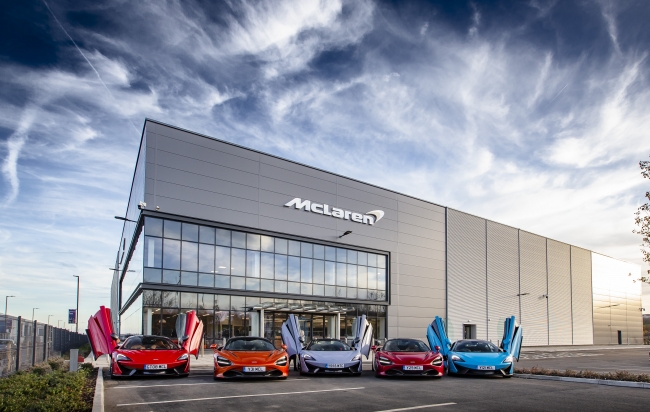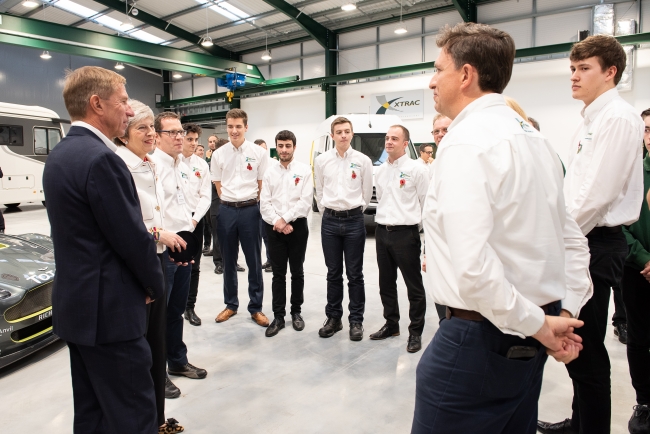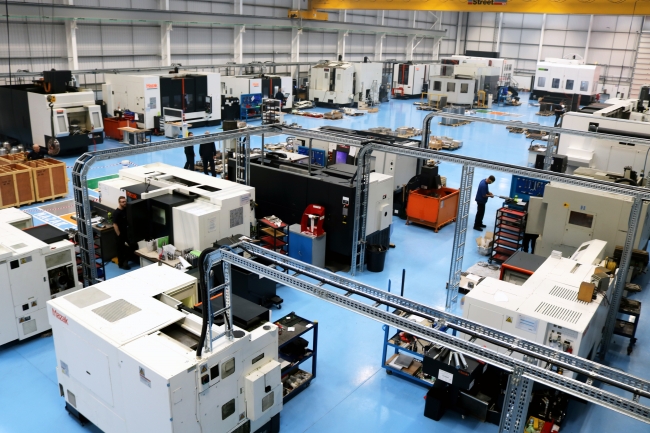Good problem solving can seriously help you with the performance in your plant. During the 2016 Olympics in Rio, the Japanese Men’s 4x100m relay team was quite the underdog. None of their team had ever run 100m in under 10 seconds. Yet they stunningly won the silver medal! They achieved this through good problem solving, as Christoph Roser explores further in this article.
Read more
5 minute read
The Friday Roundup – 16/11/2018

Every Friday, we round up our top 5 most popular reads from the week, along with sharing some of our favourite finds from around the web.
This week’s roundup sees McLaren launch its new production facility in Sheffield, Theresa May opens Xtrac’s £22m factory extension, plus could a small start-up have the answer to reducing microfibre pollution…?
Our top 5 most read this week
1. McLaren Automotive opens its new £50m Sheffield facility
McLaren Automotive has officially opened its new £50m production facility in Sheffield. Opened by The Duke and Duchess of Cambridge and HRH Prince Salman bin Hamad Al Khalifa, the Crown Prince of the Kingdom of Bahrain, the McLaren Composites Technology Centre (MCTC) aims to be a world-leader in innovating lightweight carbon fibre and composites that will work together with future powertrain development to save weight and produce greater energy efficiencies. Prototyping has already begun on innovating McLaren’s next generation of lightweight carbon fibre tubs that are integral to the agility and performance of its sportscars and supercars. First announced in February 2017, construction commenced just five months later and following six months of fit-out, the MCTC is now the company’s first purpose-built facility outside of the current McLaren campus in Surrey. After completing trial tubs in 2019 and once fully operational in 2020, the MCTC will create over 200 direct jobs and produce carbon fibre tubs that will be sent to the McLaren Production Centre (MPC) in Woking, Surrey, for hand assembly into cars, over 90 per cent of which are then exported to markets worldwide.
Read more
2. Prime Minister opens £22m Xtrac factory extension
Berkshire-based automotive and motorsport specialist Xtrac welcomed the Prime Minister last week to open its new manufacturing facility extension that will ultimately represent a £22 million investment in UK manufacturing. The Prime Minister’s visit to Xtrac took place ahead of the company co-hosting a Festival of Engineering involving budding engineers from schools across West Berkshire and North West Hampshire. Peter Digby, president of Xtrac, showed the Prime Minister around the company’s premises, which operates 24 hours a day to create advanced gearboxes used by motorsports teams around the world and in hybrid and electric high-performance road cars. Following the Prime Minister’s visit, Xtrac co-hosted 400 secondary school students, as part of the Year of Engineering initiative, a government campaign which celebrates the world and wonder of engineering. Xtrac has won numerous awards for its apprenticeship and undergraduate training programmes with one in seven (14%) of its 350 employees having started with the company as apprentices or undergraduates. Indeed, the company’s first ever apprentice Simon Short who qualified 25 years ago remains with the company, holding a senior role in Xtrac’s North American operations.
Read more
3. Pryme Group officially opens new £10m facility
Norma Redfearn CBE, elected mayor of North Tyneside, has officially opened the new, state-of-the-art facility of integrated manufacturing specialist, Pryme Group. Staff have relocated from nearby Ryton, Tyne and Wear, to a purpose-built engineering services and manufacturing centre at the Tyne Tunnel Estate, North Shields, following a £10million investment. With operations across the UK and headquarters in Dundee, Pryme Group provides integrated manufacturing solutions for the oil and gas, aerospace and defence industries. The business expects to more than double its current workforce in North Tyneside from 70 to 150 in the next five years, and is actively recruiting for new personnel, including CNC operators, by the end of the year. Angus Gray, CEO of Pryme Group, said: “I am excited about what the future holds for the business and the local area now that this site has been fully opened. Not only will the new Centre of Excellence provide a boost to the group’s existing capabilities, but it will create enhanced opportunities for our clients operating across the UK and internationally.”
Read more
4. Almost 50,000 joined biggest simultaneous STEM assembly
Tomorrow’s Engineers Week, in its sixth year, came to a close last Friday following a record-breaking week of activity. The highlight of the week was the Tomorrow’s Engineers Week Big Assembly where almost 50,000 students all took part in the same school assembly at the same time, connected by a live video stream and social media. Broadcaster Fayon Dixon, who hosted the Tomorrow’s Engineers Week Big Assembly, said: “The Big Assembly used the power of technology to connect people together and inspire students about how engineers make the world a better place. We heard inspiring stories from engineers who are helping to save the environment, develop medical procedures, keep us safe, help animals and even entertain us. Viewers of the Tomorrow’s Engineers Week Big Assembly heard about different routes into the industry, learnt that engineers are in demand, earn good money and make a difference to the world.” Schools, colleges, students and parents can watch the Big Assembly again on demand at tomorrowsengineers.org.uk.
Read more
5. Competitiveness programme nets over £3bn for UK aerospace
Sharing in Growth has announced that productivity gains made through its aerospace competitiveness programme have resulted in more than £3 billion in contracts, including an £80 million six-year deal between Rolls-Royce Civil Aerospace and Glasgow-based Castle Precision Engineering. Rolls-Royce Chief Executive, Warren East said: “There is a national need for competitive and match-fit suppliers who are able to win work from companies like Rolls-Royce. What Castle has done is what we all do every day: look at our costs and how we can reduce them, look at how we increase the quality of what we do, and look at how – through clear leadership, technical and business process innovation – we can make our business more competitive and win more orders. Some of this we do ourselves, some of this we do with partners, including Government, and the Government’s funding of Sharing in Growth has made a significant difference to our supply chain, as well as to others in the aerospace sector.” Sharing in Growth CEO, Andy Page, concluded: “Not only has Sharing in Growth been pivotal in supporting programme participants to secure £3.2 billion in contracts, over a year ahead of schedule, but we are well on target to safeguard 10,000 UK jobs by 2022, securing well over £60 of contracts for every £1 of Government investment.”
Read more
Our favourite #GBmfg & #UKmfg tweets of the week
British firms secure £2 billion of deals at expo in Shanghai including £850m @RollsRoyce export order https://t.co/wn5mQilSri #UKmfg #GBmfg🇬🇧 pic.twitter.com/pQEyY6MRSD
— Jefferson Group (@Jefferson_MFG) November 12, 2018
First Norton V4 SS rolling through production here in the factory.🏍🏁🇬🇧👌 #norton pic.twitter.com/GEErgU6VJp
— Stuart Garner (@norton_ceo) November 13, 2018
Spanish train manufacturer @TalgoGroup to create 1,000 jobs at new £40m factory in Longannet https://t.co/LboshccZF8 #UKmfg #Scotland #GBmfg pic.twitter.com/5wlrieqUzM
— Jefferson Group (@Jefferson_MFG) November 14, 2018
Looks like Norwich will retain a mustard manufacturing facility after all. New facility supported by farmers gets permission https://t.co/yVpnZ3rbWU #ukmfg #GBmfg
— Will Stirling (@WRStirling) November 10, 2018
A huge thank-you to everyone who came to celebrate our first year anniversary, it was a fantastic day to get a glimpse of what life’s like at #MCMT! Here are some pictures from the day – more to come! ⚙️🎉 #ukmfg #MARCHES1💥 pic.twitter.com/U1Sm37ClMK
— MCMT (@marchescentre) November 12, 2018
Recommendation roundup
Our picks of the best manufacturing and business related content that caught our attention this week.
1. Jaguar Land Rover’s autonomous cars will cure motion sickness / via @techradar
One of the main advantages of self-driving vehicles is the ability to get work done during the time you’d normally be driving. However, if you suffer from motion sickness, that could leave you feeling green around the gills. To solve that problem, Jaguar Land Rover is developing a system for autonomous cars that will detect motion sickness in individual passengers and automatically adjust settings until they feel better.
Read more
2. Five things you didn’t know about engineering careers / via @TheEngineerUK
Gerald Kelly, director of Professional Services at Sony UK TEC in Pencoed, Wales, shares his thoughts on why engineering careers are far more enriching and rewarding than many realise.
Read more
3. Using lean problem solving – Japanese men’s relay team Rio 2016 / via @ChristophRoser
And finally, some bonus picks to add to your reading list this weekend:
1. Remembrance Day in pictures: 100 years of commemorations / via @standardnews
The first two minute silence was held in the UK one year after the end of the First World War in 1918. On November 11, 1919, King George asked members of the public to observe a silence at 11am, so “the thoughts of everyone may be concentrated on reverent remembrance of the glorious dead”. The silence has since been observed each year at the end of the eleventh hour of the eleventh day of the eleventh month. In commemoration of 100 years since the end of World War One, these poignant archive images show how Britain has marked Remembrance Day over the last 100 years.
Read more
2. Could these balls help reduce plastic pollution? / via @BBCNews
Concern is mounting over the volume of plastics in our oceans and, in particular, how tiny particles of plastic and other synthetic materials are infiltrating every part of our ecosystem. Could small start-ups and tech have the answer to reducing microfibre pollution and keeping other microplastics out of our water systems?
Read more
Spot something you think we should see? Share with us! Email hello@zenoot.com and we may feature it in an upcoming post.




